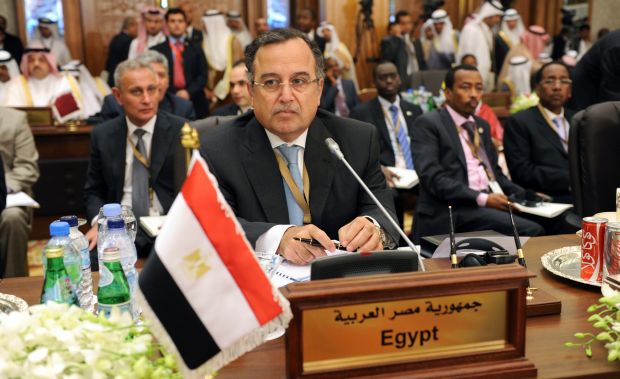
Egyptian Foreign Minister Nabil Fahmi attends the Arab—African Foreign Ministers’ meeting in Kuwait city on November 17, 2013. (AFP)
Kuwait City, Asharq Al-Awsat—In an exclusive interview with Asharq Al-Awsat against the backdrop of the Arab–African Summit in Kuwait, Egyptian Foreign Minister Nabil Fahmi spoke about Arab–African relations, economic cooperation and the Palestinian cause.
Fahmy described the third Arab–African summit, scheduled to begin on Tuesday in Kuwait, as “highly important,” particularly because the event takes place at a time when the Arab and African worlds are facing significant challenges.
“This gathering and the high levels of participation in terms of heads of state and foreign ministers will help to create political momentum in different fields,” Fahmi said.
Fahmi confirmed that the Arab–African summit will cover a variety of topics, including political, economic and social matters.
He added that a special announcement on Palestine is set to be made, saying, “The Palestinian cause is a central issue for both Arabs and Africans.”
The Egyptian foreign minister informed Asharq Al-Awsat that his country is keen to highlight the importance of the private sector, adding that it is the government’s responsibility to create the proper political climate to allow the private sector to flourish.
“For our part, we will focus on the issues of agricultural development and education,” Fahmi said, adding: “We are looking forward to fruitful Arab–African cooperation in this area.”
Fahmi said that the summit’s focus on the economy and economic cooperation is important, and that serving common interests forms the basis for promoting cooperation in the political arena.
The Egyptian foreign minister expressed satisfaction at the “serious and frank” discussions that took place during the preparatory meetings for Tuesday’s summit, expressing his hope that the outcome of the summit would live up to expectations.
Responding to a question about the recent visit by Russia’s defense and foreign ministers to Egypt, Fahmi told Asharq Al-Awsat that “Egypt does not act randomly or formulate its policies on the basis of reactions,” and emphasized the open relations between Cairo and Moscow and the countries’ intentions to encourage cooperation on all levels.
Regarding the Syrian crisis, Egypt’s top diplomat said that his country is calling for the Syrian sides to reach a political solution by building on the outcomes of Geneva I at the long-anticipated Geneva II summit.
According to Fahmi, the Geneva II talks, which are expected to start in mid-December, could lead to the formation of a transitional government in Syria that enjoys full powers.
Fahmi also denied media reports that the Egyptian administration will seek to set up an initiative to mediate between Iran and the Gulf States. However, the Egyptian foreign minister did highlight Cairo’s readiness to do everything in its power to open a dialogue between the two sides if such a desire exists. Fahmi said that Egypt has a common identity with the Gulf States and is keen on ensuring security and stability in these countries.
“Gulf security is directly linked to Egypt’s national security,” he said.
On the issue of the Ethiopian Renaissance Dam, Fahmi told Asharq Al-Awsat that the problem should be viewed from a wider perspective because it is related to a “more vital issue,” which he said was “benefitting from the Nile in a cooperative manner” that secures the interests of all involved parties without damaging any side.
“Water issues are important and are put forward in many meetings, especially the bilateral ones between foreign ministers,” Fahmi said.
He added: “President Adly Mansour will hold a summit with Arab and African leaders to discuss all of the issues in the region and the Middle East.”
Regarding reports of Kuwait hosting a meeting over the Nile between Sudan, South Sudan, Uganda, Ethiopia and Egypt, Fahmi said, “I have no knowledge of this summit but [we] welcome such a proposal and any effort exerted on this issue.”
Asked about any disputes with Tunisia and Qatar and the possibility of holding meetings with these countries on the sidelines of the current summit, Fahmi denied claims of major disputes with any Arab countries.
The Egyptian foreign minister also said that relations with Tunisia are stable and that he conducts ongoing meetings with Qatari officials regardless of their political stances.
As for the position the Palestinian cause will occupy at the summit, particularly in light of the violations committed by the Israeli side, Fahmi told Asharq Al-Awsat that participants will issue a statement on the situation there, stressing that Arabs must not ignore or neglect the Palestinian cause at international forums.
“We cannot ignore it or allow it to disappear, and we stress the necessity of reaching a political settlement and a just solution based on an independent [Palestinian] state with Jerusalem as its capital, along with an end to Israel’s settlement policies and plans,” Fahmi said.
